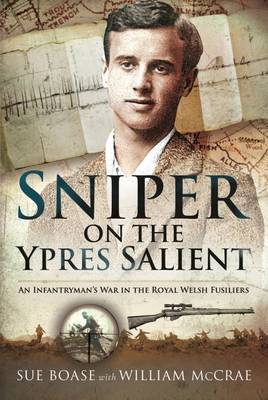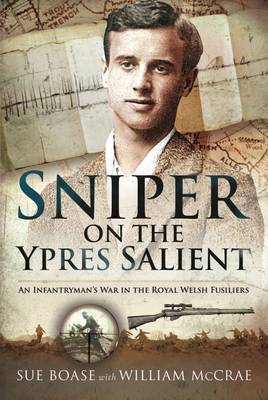
Vous voulez être sûr que vos cadeaux seront sous le sapin de Noël à temps? Nos magasins vous accueillent à bras ouverts. La plupart de nos magasins sont ouverts également les dimanches, vous pouvez vérifier les heures d'ouvertures sur notre site.
- Retrait gratuit dans votre magasin Club
- 7.000.000 titres dans notre catalogue
- Payer en toute sécurité
- Toujours un magasin près de chez vous
Vous voulez être sûr que vos cadeaux seront sous le sapin de Noël à temps? Nos magasins vous accueillent à bras ouverts. La plupart de nos magasins sont ouverts également les dimanches, vous pouvez vérifier les heures d'ouvertures sur notre site.
- Retrait gratuit dans votre magasin Club
- 7.000.0000 titres dans notre catalogue
- Payer en toute sécurité
- Toujours un magasin près de chez vous
Sniper on the Ypres Salient
An Infantryman's War in the Royal Welsh Fusiliers
Sue Boase
Livre relié | Anglais
30,95 €
+ 61 points
Description
Just after midnight on 22 April 1916 on the Western Front, a sergeant from the 15th (1st London) Royal Welsh Fusiliers came sliding and stumbling along the dark, mud-filled trench towards the four men, huddled together and soaked-through, in the shallow dugout. He was clutching his postbag in which there were four parcels for one of them, William McCrae, whose twentieth birthday fell on this day.
A hand-written account by William, the author's grandfather, was found in her mother's papers, long after his death. This book describes a year of his time fighting in the First World War, from December 1915 to December 1916.
Two months after his birthday, he was marching towards the Somme, where he was to act as a runner during the key Welsh engagement in the Battle of Mametz Wood. Later, he went on to volunteer and train as a sniper. He continued in this role for over a year, becoming a lance corporal in the 38th Divisional Sniping Company while fighting on the Ypres Salient. His words emphasise the key role snipers played in the collecting of intelligence about the enemy, through close observation and careful reporting.
His account stops abruptly in mid-sentence, just at the point where he indicates he is about to reveal more to us about 'a new, interesting part of the line to be manned by us Snipers'.
Piecing together clues from his sketches, maps and photos, this book paints a picture of Williams' time during the rest of the war. In 1917 he returned to England to train as a temporary officer in the 18th Officer Cadet Battalion at Prior Park, Bath. He came back to the Western Front as a 2nd Lieutenant in the Duke of Wellington's (West Riding) Regiment, where he was seconded to the 1/5 Lancashire Fusiliers until the end of the war. During this time, it is likely that his interest and experience as a sniper continued, with evidence that he may have taught at one of the Sniping Schools set up across France.
A hand-written account by William, the author's grandfather, was found in her mother's papers, long after his death. This book describes a year of his time fighting in the First World War, from December 1915 to December 1916.
Two months after his birthday, he was marching towards the Somme, where he was to act as a runner during the key Welsh engagement in the Battle of Mametz Wood. Later, he went on to volunteer and train as a sniper. He continued in this role for over a year, becoming a lance corporal in the 38th Divisional Sniping Company while fighting on the Ypres Salient. His words emphasise the key role snipers played in the collecting of intelligence about the enemy, through close observation and careful reporting.
His account stops abruptly in mid-sentence, just at the point where he indicates he is about to reveal more to us about 'a new, interesting part of the line to be manned by us Snipers'.
Piecing together clues from his sketches, maps and photos, this book paints a picture of Williams' time during the rest of the war. In 1917 he returned to England to train as a temporary officer in the 18th Officer Cadet Battalion at Prior Park, Bath. He came back to the Western Front as a 2nd Lieutenant in the Duke of Wellington's (West Riding) Regiment, where he was seconded to the 1/5 Lancashire Fusiliers until the end of the war. During this time, it is likely that his interest and experience as a sniper continued, with evidence that he may have taught at one of the Sniping Schools set up across France.
Spécifications
Parties prenantes
- Auteur(s) :
- Editeur:
Contenu
- Nombre de pages :
- 224
- Langue:
- Anglais
Caractéristiques
- EAN:
- 9781399095570
- Date de parution :
- 29-11-22
- Format:
- Livre relié
- Format numérique:
- Genaaid
- Dimensions :
- 157 mm x 236 mm
- Poids :
- 453 g







